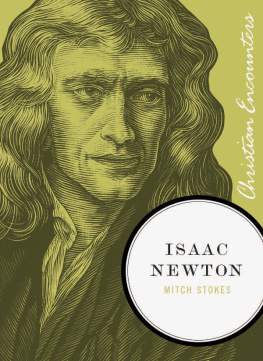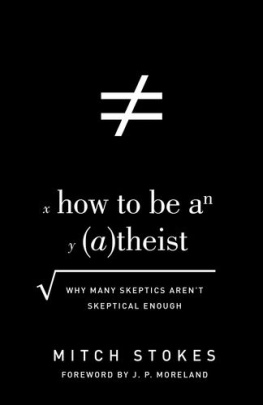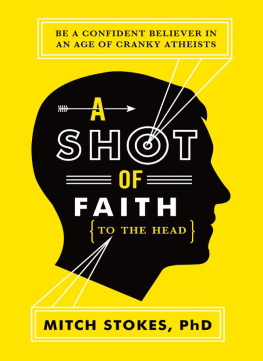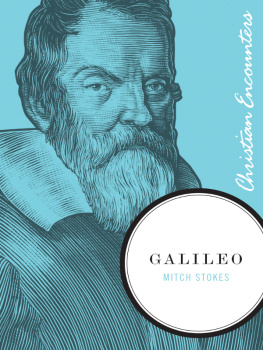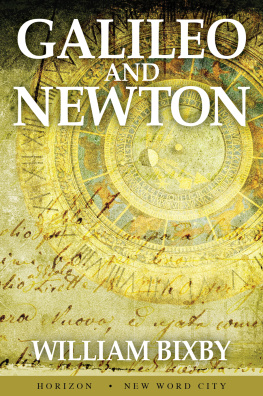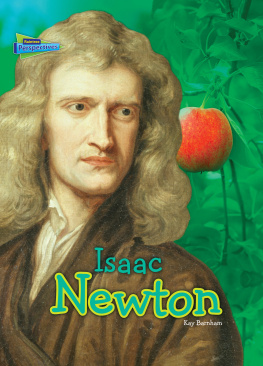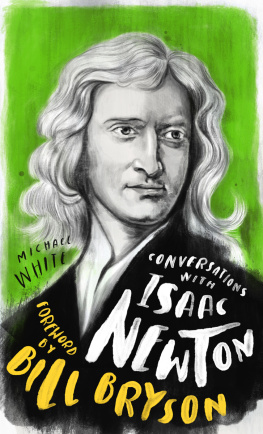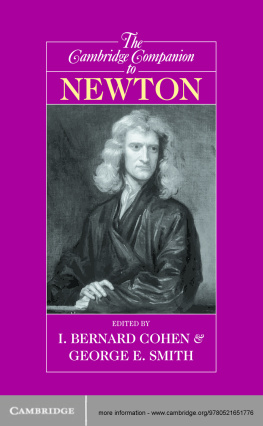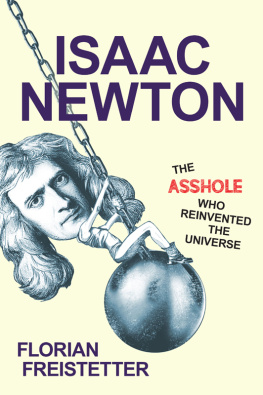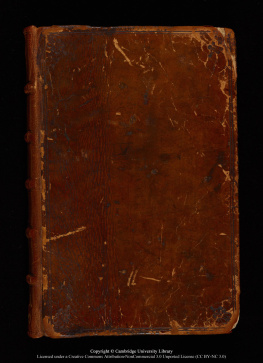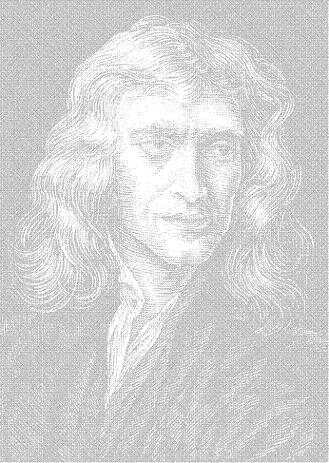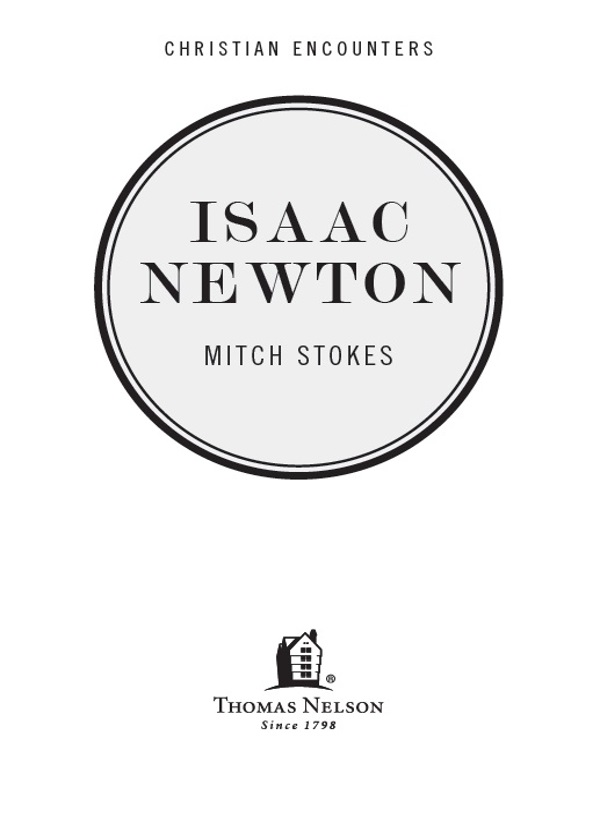All rights reserved. No portion of this book may be reproduced, stored in a retrieval system, or transmitted in any form or by any meanselectronic, mechanical, photocopy, recording, scanning, or otherexcept for brief quotations in critical reviews or articles, without the prior written permission of the publisher.
Published in Nashville, Tennessee, by Thomas Nelson. Thomas Nelson is a registered trademark of Thomas Nelson, Inc.
Thomas Nelson, Inc., titles may be purchased in bulk for educational, business, fund-raising, or sales promotional use. For information, please e-mail SpecialMarkets@ThomasNelson.com.
Stokes, Mitch.
Isaac Newton / by Mitch Stokes.
p. cm.
Includes bibliographical references (p. ).
ISBN 978-1-59555-303-4
1. Newton, Isaac, Sir, 1642-1727. 2. ScientistsGreat BritainBiography. 3. SciencePhilosophy. 4. Newton, Isaac, Sir, 1642-1727Religion. I. Title.
QC16.N7S76 2010
530.092dc22
[B]
Please note that footnotes in this ebook may contain hyperlinks to external websites as part of bibliographic citations. These hyperlinks have not been activated by the publisher, who cannot verify the accuracy of these links beyond the date of publication.
1
A POSTHUMOUS SON
I saac Newton could still feel the dull ache in his stomach where Arthur Storer had kicked him on the way to school that morning. At twelve or thirteen years old, Isaac was small for his age. Slumped at his desk in the back of the class, he could see the older and larger boy who not only sat ahead of him in the classroom, but held a higher spot in the schools academic rankings. Once in a while one of the students would turn back and look at him; he could feel his ears burn. Newton knew that if Arthur went unchallenged, there would likely be further beatings. Boys smell fear, and some of them feed on it. Newton would have to do something. The pain in his gut was replaced by the fluttering of butterflies.
After school Isaac challenged Arthur to settle things in the churchyard next to the school. The two were followed by the rest of the boys who, like boys throughout the ages, simply couldnt resist. Isaac had something to prove and was intent on doing so. At the very least, he would defiantly take as much as the older boy could dish out. That would at least make Arthurand the othersthink twice before picking on him again. But by that time, Newtons fear had built into a violent fury, and it was Arthur who received the beating. Shocked by Isaacs ferocity, Arthur submitted and gave up, something Isaac would never do. The headmasters sona much older boypointed out that Arthur was a coward for giving up and, according to the rules of engagement, Isaac must treat him as such. Isaac complied and took Arthur by the ears, dragging his face across the stone wall, leaving a message for all to see.
Arthur must have been taken entirely by surprise. Isaacin addition to his small physical staturewas socially slight. He was quiet and removed, playing mostly alone. One of his few school friends described him as a sober, silent, thinking lad. No one would have guessed that there was fire beneath his skin.
And the fight fueled this flame. At the time, not only was he ranked behind Storer; he was second to last out of eighty or so students. (As Newton later admitted, he was very negligent in his schoolwork.) With the fight over, however, Isaac announced that he would pass Arthur in the rankings. This was a task for which Newton was naturally gifted; what he lacked in physical stature, he more than made up for intellectually. He overtook Arthur and rose quickly through the ranks of students, carving his name on every desk as he moved to the front. Positioned at the head of the school, it would be where he remained.
Were it not for this fight, in all likelihood Newton would have become a farmer. The incident is Newtons story in miniature. Throughout his life, Newton nurtured his solitude, cultivating his ideas by spending his hours in isolated contemplation. He was happiest when alone with books, papers, experiments, and ideas. When asked once how he had come up with his law of universal gravitation, he answered, By thinking on it continually. He mostly shunned the company of others in order to focus his energies on discoveries and developments. Only at the encouragement of a few close colleagues would he make these discoveries known to the outside world. He wrote millions upon millions of words in his lifetime but published only a fraction of them. And whenever debates over his theories arosewhich frequently happened given their novel naturehe was at first reluctant to engage. But when he did engage, he was deadly. Heaven help the man who opposed him with charges of plagiarism or carelessness or incompetence.
Newton was tenacious when attacking problems as well, whether in mathematics, physics, theology, or chemistry. When gripped by a puzzle, he became obsessive, continually assailing it until it finally succumbed, which it usually did. Were it not for his intensity and focus, Newton would never have made the progress he did. Like ordinary mortals, he would have been stymied. His fortitude, perseverance, and ability to focus wereon his own admissioneven more important than his innate intellectual capacity. At his birth, however, any strength he possessedphysical, mental, or otherwisewas hidden.
Newton was born on Christmas Day in a small upstairs bedroom of his familys manor house in Woolsthorpe, England. It was 1642, at least by Englands reckoning (Englands calendar was roughly ten days out of sync with the Continents). Galileo died that same year.
Isaac was born several weeks prematurely, very small, and very sick. The attending nurses were sent to the next town for medicine, but despite the seriousness of the situation, they stopped along the way to rest because they were sure that the baby was as good as dead. Yet he survived the night. And the next day. And the day after that. Each day, he precariously clung to life, his mother, Hannah, postponing his baptism in nearby Colsterworth for a week, while Isaac slowly gained strength. He was so small he could fit into a quart pot. And small he would remain; even as an adult he was short. While an infant, he was fitted with a special neck brace so he could breathe and nurse properly. But he would not remain sickly and lived eighty-four more years.
Isaac was not a son of laughter (one of his secretaries said later that he had only seen him laugh once); rather he was named after his father. But the senior Isaac Newton (New Town) had died a few months earlier, in Octoberonly six months after his marriage to Hannah. He was only thirty-six. Of what he died, we dont know, but his death was not entirely unexpected. A few days earlier, he wrote in his will that he was of sound mind but ill body. And so, in the space of a few months, Colsterworths parish registry listed three major family events for the Newtons: a death, a birth, and a baptism (the latter entry was, Isaac sonne of Isaac and Hanna Newton Baptized Jan. 1 ). Newton was a posthumous son, born after the death of his father.

